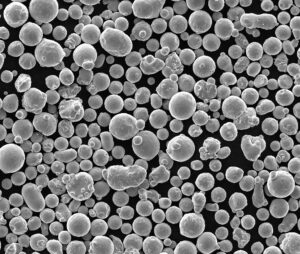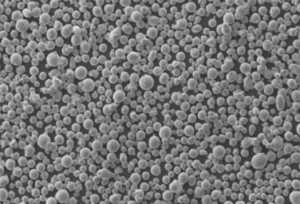BNi-7 Tozuna Genel Bakış
Yüksek sıcaklık uygulamaları için sert lehim alaşımları veya malzemeleri araştırıyorsanız, muhtemelen şunlarla karşılaşmışsınızdır BNi-7 toz. Korozyona ve oksidasyona karşı mükemmel direncinin yanı sıra güçlü, güvenilir bağlantılar oluşturma kabiliyeti nedeniyle çeşitli endüstrilerde yaygın olarak kullanılan özel bir nikel bazlı sert lehim alaşımıdır. Peki BNi-7'yi öne çıkaran tam olarak nedir? Ve neden farklı alanlarda bu kadar popüler?
BNi-7 tozu nikel, fosfor ve bor dahil olmak üzere çeşitli elementlerin bir karışımıdır. Bu elementler bir araya gelerek düşük erime noktasına sahip bir sert lehim alaşımı oluşturur, bu da onu hassas ve yüksek sıcaklıklı ortamlarda hassas sert lehimleme için ideal hale getirir. İster havacılık bileşenleri ister yüksek performanslı motorlar üzerinde çalışıyor olun, BNi-7 sert lehimleme ihtiyaçlarınız için çok yönlü bir çözüm sunar.
Bu kılavuzda, kimyasal bileşiminden gerçek dünyadaki uygulamalarına kadar BNi-7 tozunun her yönünü derinlemesine inceleyeceğiz. Hatta birkaç ürün karşılaştırması yapacak ve en iyi tedarikçilerden bazılarını vurgulayacağız, böylece satın almaya hazır olduğunuzda tam olarak nereye gideceğinizi bileceksiniz.
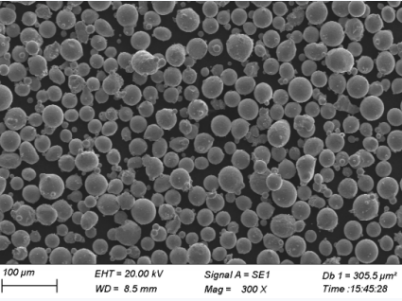
BNi-7 Tozunun Bileşimi
Yeteneklerini tam olarak değerlendirmek istiyorsanız BNi-7 tozunun bileşimini anlamak çok önemlidir. Bu anahtar malzemeler bNi-7 tozunda şunlar bulunur nikel, fosfor ve borendüstriyel uygulamalar için arzu edilen özelliklere sahip benzersiz bir alaşım oluşturmak üzere bir araya gelir.
Aşağıda BNi-7 tozunun bileşimini özetleyen bir tablo bulunmaktadır.
| Element | Yüzde Bileşim (%) |
|---|---|
| Nikel (Ni) | 92.8-93.8 |
| Fosfor (P) | 6.8-7.2 |
| Bor (B) | 0.03-0.06 |
Nikel (Ni)
Ana element olan nikel, BNi-7'ye korozyon ve oksidasyona karşı mükemmel direnç kazandırır. Alaşımın belkemiğini oluşturur ve yüksek gerilimli ortamlarda dayanıklılık sağlar.
Fosfor (P)
Fosfor alaşımın erime noktasını düşürerek hassas lehimleme işlemlerinde kullanımını kolaylaştırır. Ayrıca güçlü, sünek bağlantıların oluşmasına katkıda bulunur.
Bor (B)
Küçük miktarlarda bulunmasına rağmen bor, erime aralığını daha da azaltmaya yardımcı olarak alaşımın ısıtıldığında daha kolay akmasını sağlar.
BNi-7 Tozunun Özellikleri ve Karakteristikleri
BNi-7 gibi bir sert lehim alaşımı seçerken, alaşımın özelliklerini göz önünde bulundurmak önemlidir fi̇zi̇ksel ve mekani̇k özelli̇kler. BNi-7'yi mühendisler için bu kadar çekici kılan şey düşük erime noktası, yüksek korozyon direnci ve güçlü mekanik özellikler.
BNi-7 tozunu tanımlayan temel özellikleri inceleyelim.
| Mülkiyet | Değer |
|---|---|
| Erime Noktası | 875°C - 890°C |
| Yoğunluk | 8.7 g/cm³ |
| Korozyon Direnci | Birçok ortamda mükemmel |
| Oksidasyon Direnci | Yüksek sıcaklıklarda bile yüksek |
| Akış Karakteristikleri | Erime noktasında mükemmel akışkanlık |
| Eklem Gücü | Yüksek mekanik mukavemet |
Erime Noktası
BNi-7'nin düşük erime noktası (yaklaşık 875°C), hassasiyetin önemli olduğu sert lehimleme işlemlerinde kullanılmasına olanak tanır. Bu özellikle aşırı yüksek sıcaklıklara dayanamayan bileşenler için kullanışlıdır.
Korozyon ve Oksidasyon Direnci
BNi-7 tozunun öne çıkan özelliklerinden biri de korozyona karşı üstün direnç ve veyüksek sıcaklıklarda bile. Bu sayede havacılık veya kimyasal işleme tesisleri gibi bileşenlerin zorlu koşullara maruz kaldığı ortamlar için idealdir.
Mekanik Dayanım
Düşük erime noktasına rağmen, BNi-7 ile oluşturulan lehimli bağlantılar inanılmaz derecede güçlüdür. Bu mekanik güç, BNi-7 ile yapıştırılan parçaların önemli gerilime dayanabilmesini sağlayarak yük taşıyan uygulamalar için uygun hale getirir.
BNi-7 Tozunun Avantajları
BNi-7 tozunun bileşimine ve özelliklerine baktığımıza göre, şimdi de avantajlar diğer sert lehim alaşımlarına göre. Neden bu kadar çok uygulamada üstün olduğu düşünülüyor?
| Avantaj | Açıklama |
|---|---|
| Düşük Erime Sıcaklığı | Hassas lehimleme uygulamalarında daha kolay çalışma |
| Korozyon ve Oksidasyon Direnci | Zorlu ortamlarda bozulmadan kullanılabilir |
| Yüksek Eklem Dayanımı | Parçalar arasında güçlü, güvenilir bağlantılar sağlar |
| Mükemmel Akışkanlık | Sert lehimleme sıcaklığında iyi akar, tam kaplama sağlar |
| Çok Yönlülük | Havacılık, otomotiv ve elektronik dahil olmak üzere çeşitli endüstrilerde kullanılabilir |
Düşük Erime Sıcaklığı
BNi-5 veya BNi-2 gibi diğer sert lehim alaşımları ile karşılaştırıldığında, BNi-7 daha düşük erime sıcaklığı'de uygulanmasını kolaylaştırır hassas veya ısıya duyarlı uygulamalar. Bu, özellikle aşırı ısı altında bükülebilecek ince veya küçük bileşenlerle çalışırken kullanışlıdır.
Korozyon Direnci
BNi-7, diğer birçok alaşımdan daha iyi performans gösterir korozyon ve oksidasyonbu da onu güvenilirliğin kritik olduğu kimyasal işleme tesisleri, kazanlar ve havacılık uygulamaları için en iyi seçenek haline getirir.
Mekanik Dayanım
Stresi kaldırabilen lehimli bir bağlantıya ihtiyacınız olduğunda, BNi-7 bunu sağlar. Onun yüksek mekanik dayanım daha yumuşak, daha zayıf alaşımlara göre yük taşıma uygulamaları için daha iyi bir seçenek haline getirir.
Karşılaştırma BNi-7 Tozu diğer Nikel Bazlı Sert Lehim Alaşımları ile
Bir sert lehim alaşımı seçerken, BNi-7'yi diğer mevcut seçeneklerle karşılaştırarak nasıl bir performans sergilediğini görmek faydalı olacaktır. Aşağıda BNi-7 ile BNi-1, BNi-2, BNi-3, BNi-4 ve BNi-5 gibi diğer nikel bazlı sert lehim alaşımları arasında bir karşılaştırma tablosu bulunmaktadır.
| Alaşım | Erime Noktası (°C) | Korozyon Direnci | Eklem Gücü | En İyi Uygulamalar |
|---|---|---|---|---|
| BNi-7 | 875-890 | Mükemmel | Yüksek | Havacılık ve uzay, kimyasal işleme |
| BNi-1 | 955-980 | Orta düzeyde | Orta düzeyde | Genel amaçlı sert lehimleme |
| BNi-2 | 970-995 | İyi | Yüksek | Yüksek sıcaklık uygulamaları |
| BNi-3 | 970-1005 | Mükemmel | Çok Yüksek | Gaz türbinleri, motorlar |
| BNi-4 | 995-1010 | Yüksek | Çok Yüksek | Havacılık ve uzay, yüksek stresli uygulamalar |
| BNi-5 | 1050-1070 | Düşük | Çok Yüksek | Çok yüksek sıcaklık uygulamaları |
BNi-7 vs BNi-5
Bir yandan BNi-5 daha yüksek bir birleşme mukavemetine sahiptir, aynı zamanda çok daha yüksek bir erime noktasına (1050-1070 ° C) sahiptir, bu da onunla çalışmayı daha zor hale getirir sıcaklığa duyarlı uygulamalar. Buna karşılık, BNi-7'nin daha düşük erime noktası onu hassas lehimleme için daha iyi seçim.
BNi-7 vs BNi-2
Ile karşılaştırıldığında BNi-2, BNi-7 bir daha düşük erime sıcaklığı ancak mükemmel bağlantı mukavemeti ve korozyon direncini korur. Eğer uygulamanız bir daha düşük ısı yükü, BNi-7 genellikle bir daha iyi seçenek.
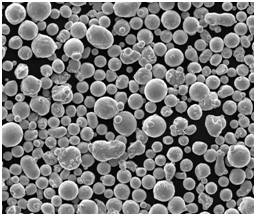
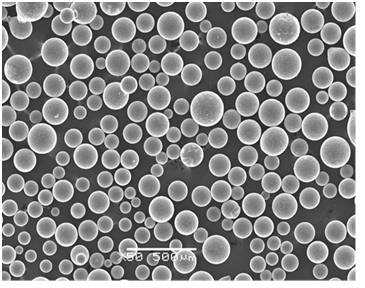
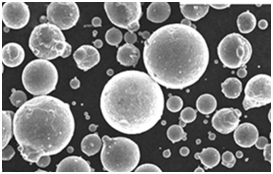
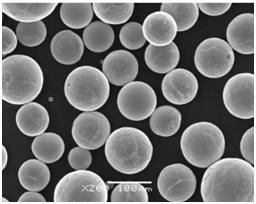
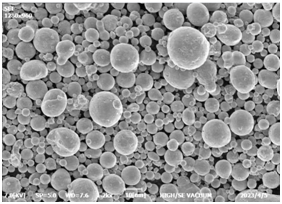

BNi-7 Toz Uygulamaları
BNi-7, benzersiz özellik karışımı sayesinde çok çeşitli sektörlerde kullanılmaktadır. Bazı temel özellikleri inceleyelim uygulamalar bNi-7 tozunun:
| Endüstri | Uygulama |
|---|---|
| Havacılık ve Uzay | Türbin kanatlarının, motor bileşenlerinin, ısı eşanjörlerinin birleştirilmesi |
| Otomotiv | Egzoz sistemleri, turboşarjlar ve yakıt enjektörlerinin lehimlenmesi |
| Kimyasal İşleme | Aşındırıcı kimyasallara maruz kalan bileşenlerin birleştirilmesi |
| Elektronik | Isı alıcılarının, RF kalkanlarının ve diğer hassas bileşenlerin lehimlenmesi |
| Enerji Üretimi | Kazanlar, türbinler ve enerji santrali sistemleri için lehimleme bileşenleri |
Havacılık ve Uzay
İçinde havacılık ve uzay endüstrisibNi-7, aşağıdaki gibi kritik bileşenlerin sert lehimlenmesinde yaygın olarak kullanılır türbin kanatlarında ve ısı eşanjörleriyüksek mukavemet ve korozyon direncinin gerekli olduğu yerlerde. Bu bileşenler genellikle şu ortamlarda çalışır ekstrem ortamlar yüksek sıcaklıklar ve aşındırıcı gazlar ile.
Otomotiv
BNi-7 tozu şu alanlarda kullanılır otomoti̇v endüstri̇si̇ gibi bileşenlerin lehimlenmesi için Otomotiv sektöründe,, egzoz sistemlerive yakıt enjektörleri. Alaşımın yüksek sıcaklıklara dayanma ve korozyona direnme kabiliyeti, onu bu ürünler için mükemmel kılar yüksek performansli uygulamalar.
BNi-7 Tozu için Özellikler ve Standartlar
BNi-7 tozu mevcuttur
çeşitli sınıflar ve boyutlarve çeşitli endüstri standartlarına uygundur. Aşağıdaki tablo aşağıdakilere genel bir bakış sunmaktadır spesifikasyonlar üreticilerin ve tedarikçilerin BNi-7 tozu için tipik olarak takip ettikleri bir yöntemdir.
| Şartname | Açıklama |
|---|---|
| Toz Boyutu | 45-150 µm (tipik aralık) |
| Uygun Standartlar | AWS A5.8, AMS 4777, ISO 17672 |
| Ambalaj Boyutu | 1 kg, 5 kg, 10 kg olarak mevcuttur |
| Form | Toz, macun, preformlar |
| Saflık | 99+ Nikel içeriği |
Standartlar
BNi-7 tozu, aşağıdaki gibi kuruluşlar tarafından belirlenen standartları karşılamalıdır Amerikan Kaynak Topluluğu (AWS) ve Havacılık Malzemeleri Özellikleri (AMS) tutarlı kalite ve performans sağlamak için. Örneğin, AWS A5.8 sert lehimlemede kullanılan dolgu metalleri için yaygın olarak tanınan bir standarttır.
En İyi BNi-7 Toz Tedarikçileri ve Fiyatlandırma
BNi-7 tozu için saygın bir tedarikçi bulmak, özellikle kritik uygulamalar üzerinde çalışırken çok önemlidir. İşte bunlardan bazıları en i̇yi̇ tedari̇kçi̇ler bNi-7 tozunun yaklaşık fiyatlandırma kılavuzu ile birlikte.
| Tedarikçi | Fiyat (kg başına) | Form | Minimum Sipariş |
|---|---|---|---|
| Vezüv | $200-$250 | Toz, macun | 1 kg |
| Duvar Colmonoy | $220-$270 | Toz | 5 kg |
| Morgan İleri Malzemeler | $230-$280 | Toz, preformlar | 2 kg |
| Lucas-Milhaupt | $210-$260 | Toz, preformlar | 1 kg |
Fiyatlandırma
BNi-7 tozu fiyatları tipik olarak aşağıdakiler arasında değişir kilogram başına 200 ila 280 dolartedarikçiye, sipariş boyutuna ve forma (toz, macun veya preformlar) bağlı olarak. Fiyat aşağıdaki gibi faktörlere bağlı olarak dalgalanabilir saflık, toz boyutuve si̇pari̇ş mi̇ktari.
BNi-7 Tozu Kullanmanın Artıları ve Eksileri
Her malzeme gibi BNi-7 tozu da kendine has özellikleri ile birlikte gelir avantajlar ve sınırlamalar. İşte bir döküm artılar ve eksiler lehimleme uygulamalarında BNi-7 tozunun kullanılması.
| Artıları | Eksiler |
|---|---|
| Düşük erime sıcaklığı | Bazı alternatiflere kıyasla daha yüksek maliyet |
| Yüksek korozyon direnci | Demir dışı uygulamalarla sınırlıdır |
| Güçlü mekanik özellikler | Özel taşıma ekipmanı gerektirir |
| Mükemmel akışkanlık ve akış özellikleri | Küçük miktarlarda elde edilmesi zor olabilir |
Avantajlar
BNi-7 şu konularda üstündür korozyon di̇renci̇, akış özelliklerive mekanik dayanımiçin uygun hale getirir yüksek performansli uygulamalar hassasiyet ve dayanıklılığın önemli olduğu yerlerde.
Dezavantajlar
Bununla birlikte, bazı sınırlamalarla birlikte gelir daha yüksek fiyat bNi-1 veya BNi-2 gibi daha basit sert lehim alaşımlarına kıyasla. Aynı zamanda tedarik edilmesi daha zor olma eğilimindedir küçük miktarlarbu da hobiciler veya küçük dükkanlar için bir sorun olabilir.
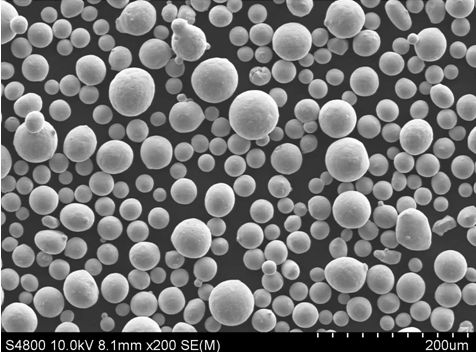
SSS
S: BNi-7 tozunun diğer sert lehim alaşımlarına kıyasla ana avantajı nedir?
C: BNi-7 tozunun bir düşük erime noktası ve yüksek korozyon direncihassasiyet ve dayanıklılığın gerekli olduğu yüksek performanslı uygulamalar için idealdir.
S: BNi-7 tozu otomotiv uygulamalarında kullanılabilir mi?
C: Evet, BNi-7 otomotiv endüstrisinde sert lehimleme için yaygın olarak kullanılır Otomotiv sektöründe,, yakıt enjektörlerive egzoz sistemleri.
S: BNi-7 tozunun erime sıcaklığı aralığı nedir?
C: BNi-7 tozunun erime sıcaklığı aşağıdakiler arasında değişir 875°C ila 890°Cdiğer nikel bazlı sert lehim alaşımlarına kıyasla nispeten düşüktür.
S: BNi-7 tozu yüksek sıcaklık uygulamaları için uygun mudur?
C: Evet, BNi-7 yüksek sıcaklıklara dayanabilir ve mükemmel oksidasyon direncigibi uygulamalar için uygun hale getirir türbin kanatlarında ve ısı eşanjörleri.
S: BNi-7 tozunu nereden satın alabilirim?
C: BNi-7 tozu aşağıdaki gibi büyük tedarikçilerden temin edilebilir Vezüv, Duvar Colmonoy, Lucas-Milhauptve Morgan İleri Malzemeler.
Sonuç
Özetle, BNi-7 toz çok yönlü bir sert lehim alaşımıdır korozyon di̇renci̇, oksidasyon direncive mekanik dayanımgibi çok çeşitli endüstriler için ideal hale getirir havacılık 'e kadar, NiCrPSi tozu çeşitli işlemlerde kullanılacak kadar çok yönlüdür. İster yoğun kaplamalara ister hassas, katmanlı 3D baskılı bileşenlere ihtiyacınız olsun, bu alaşım her iki durumda da etkili bir şekilde performans gösterir ve mühendislere ve üreticilere esneklik sunar. denizcilik. düşük erime noktası bile hassas sert lehimlemeye olanak tanır sıcaklığa duyarlı uygulamalar.
İster lehimliyor olun türbin kanatlarında, Otomotiv sektöründe,veya ısı eşanjörleribNi-7 tutarlı ve güvenilir sonuçlar verir. Daha basit alaşımlara kıyasla daha yüksek bir fiyat etiketi ile gelse de, üstün özellikleri onu aşağıdakiler için yatırıma değer kılmaktadır yüksek performanslı, yüksek stresli uygulamalar.
Eğer siz de BNi-7 tozgibi faktörleri göz önünde bulundurmayı unutmayın saflık, toz boyutuve tedari̇kçi̇ i̇ti̇bari. Çok sayıda seçenek sayesinde, özel ihtiyaçlarınızı karşılayacak mükemmel BNi-7 ürününü bulabilirsiniz.
